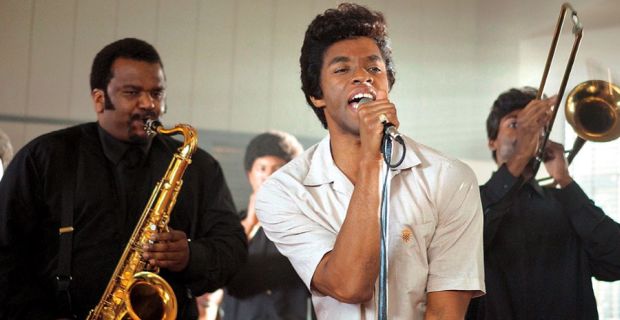
Film: Get On Up
Starring: Chadwick Boseman, Nelsan Ellis, Dan Aykroyd
Directed by: Tate Taylor
Chadwick Boseman, who previously played Jackie Robinson in 2013’s 42, nails down James Brown’s eccentric presence in an otherwise generic biopic that loses its groove while jumping between big moments in the legendary musician’s life. Get On Up plays like a track list of Brown’s greatest hits performed by a mediocre cover band that can’t quite capture the energy that the original artist exudes. Held up by solid performances from True Blood’s Nelsan Ellis and the always welcome Dan Aykroyd, Get On Up only briefly rises to the occasion to provide an objective view of Brown’s life off-stage.
If James Brown’s life in the spotlight were a book, this film would only be the chapters that catered to every single trope used in biographical adaptation made today. Yes that includes drug abuse, distant/abusive parents, the struggle to overcome racial adversity, and my personal favorite: the character’s pride bringing about the downfall of his/her sanity and career. These crucial moments in Brown’s life are drowned in a cinematic timeline that treats time travel worse than Back to the Future. The haphazardly way that the film flops from decade to decade may tire out the viewer, who at that point may be wishing for something more conventional. You know, like a recreation of Brown’s life from childhood to death with no deviations.
Boseman as Brown breaks the fourth wall and talks directly to the viewer at multiple points during the film, akin to the narrative style of Jersey Boys. The problem with that approach is that every moment that this occurs, no useful insight is really given to the situation in which it happens. We see exactly where the story is going and talking directly to the viewer is useless as all of the character motivations are clearly spelled out via their actions. Brown has gone through his share of unfair obstacles in his life, but putting these obstacles on the screen does much more for the viewer than having an internal narration.
Where the film flourishes and glides its feet above tired old territory is watching Boseman carry out normal things that Brown would do, like shoot a shotgun off prematurely in an office full of people. Watching Boseman envelop himself in the enigma that is James Brown is a pleasure in itself. Hearing the character actor belt out “good God!” in the same raspy and somewhat exasperated voice that Brown was known for made me long for the day when he was still headlining at the Apollo. Maybe that was Get On Up’s goal though; to make the viewer long for what was and not what is. If that’s the case, I guess the film succeeded.
Dan Aykroyd may be playing the Jewish band manager archetype but he owns every second of it. Much of the comedic relief comes from watching this Ghostbuster try to be hip and cool in front of other people. Aykroyd’s Ben Bart is oftentimes goofy to the point of being sappy and heartfelt. It is because of this characterization that the viewer may end up caring for him more than they do for Brown. Ellis, seemingly breaking free from his flamboyant character on True Blood, plays Brown’s longtime cohort Bobby Byrd. Byrd plays second fiddle to Brown for most of the film and it was somewhat entertaining to see Ellis roll his eyes at every absurd thing his longtime collaborator does.
Get On Up deserves credit for creating an image of Brown that isn’t meant to make him look like the funk messiah he has been referred to as. Brown, like everyone else in this world, has fatal flaws that would irk some viewers. The writers did not skimp on the fact that Brown was a wife beater and smoked crack in his later years. Inclusions like these help paint an objective picture that sometimes you don’t get in biographical films made today.
As the final act rolls around, a muddled message about redemption from vices tries to sneak its way into the narrative. At that point, though, we understand already that Brown regrets things in his life and is trying to atone for those regrets. It’s too bad that it comes too late in the game to really care, though. Get On Up may fail as a coherent dramatic piece but its biggest loss is struggling to find a way to tell this interesting story about Brown. We will always have those funk-centric records to spin, though, which are all of James Brown’s history that I need.
GRADE: C
- MOVIE REVIEW: ‘Popstar’ has at least a few hits - June 3, 2016
- MOVIE REVIEW: ‘Neighbors 2: Sorority Rising’ is the rare sequel that tries - May 21, 2016
- MOVIE REVIEW: ‘The Nice Guys’ is a loopy, drunk masterpiece - May 20, 2016
